

s0rB0ci.jpg (1193×1571) The Mirror Moment: A Method for Both Plotters and Pantsers. I want to thank Katie for giving me some space here to talk about my new book, Write Your Novel From the Middle.
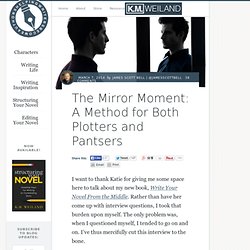
Rather than have her come up with interview questions, I took that burden upon myself. The only problem was, when I questioned myself, I tended to go on and on.
25 Things You Should Know About Storytelling. 1.
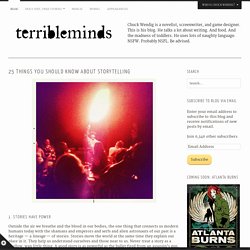
Stories Have Power Outside the air we breathe and the blood in our bodies, the one thing that connects us modern humans today with the shamans and emperors and serfs and alien astronauts of our past is a heritage — a lineage — of stories. Stories move the world at the same time they explain our place in it. They help us understand ourselves and those near to us. Dirty 30s! - The Lester Dent Pulp Paper Master Fiction Plot. This is a formula, a master plot, for any 6000 word pulp story.
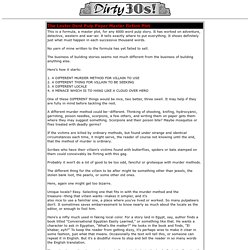
It has worked on adventure, detective, western and war-air. It tells exactly where to put everything. It shows definitely just what must happen in each successive thousand words. No yarn of mine written to the formula has yet failed to sell. The business of building stories seems not much different from the business of building anything else. Here's how it starts: One of these DIFFERENT things would be nice, two better, three swell. A different murder method could be--different. If the victims are killed by ordinary methods, but found under strange and identical circumstances each time, it might serve, the reader of course not knowing until the end, that the method of murder is ordinary. Scribes who have their villain's victims found with butterflies, spiders or bats stamped on them could conceivably be flirting with this gag.
Probably it won't do a lot of good to be too odd, fanciful or grotesque with murder methods. Bad Writing Index. 25 Ways To Plot, Plan and Prep Your Story. I’m a panster at heart, plotter by necessity — and I always advocate learning how to plot and plan because inevitably someone on the business side of things is going to poke you with a pointy stick and say, “I want this.”
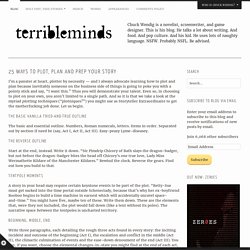
Thus you will demonstrate your talent. Even so, in choosing to plot on your own, you aren’t limited to a single path. And so it is that we take a look at the myriad plotting techniques (“plotniques?”) You might use as Storyteller Extraordinaire to get the motherfucking job done. Let us begin. The Basic Vanilla Tried-And-True Outline The basic and essential outline. The Reverse Outline Start at the end, instead.
Tentpole Moments A story in your head may require certain keystone events to be part of the plot. Beginning, Middle, End A Series Of Sequences Chapter-By-Chapter For novel writers, you can chart your story by its chapters. Beat Sheet Mind-Maps Happy blocks and bubbles connected to winding bendy spokes connected to a central topical hub. Zero Draft Write A Script Collage. Stupid Plot Tricks. Excerpted from my lecture on Stupid Plotting Tricks By Teresa Nielsen Hayden Start with some principles: A plot doesn't have to be new.
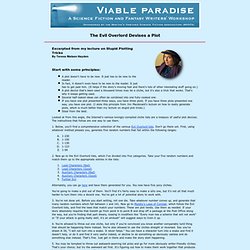
It just has to be new to the reader. In fact, it doesn't even have to be new to the reader. Looked at from this angle, the Internet's various lovingly-compiled cliche lists are a treasury of useful plot devices. 1. 2. Alternately, you can go here and have them generated for you. You're going to make a plot out of them. 3. 4. 5. 6. Did I hear someone murmur that this is overkill? Overkill is good for you! Flee, puny humans! Five Plot Devices That Hurt Your Writing. A few weeks ago, I wrote a column about some of the more predictable stories that show up in fiction workshops. This week I’d like to do something similar: I want to discuss a few popular plot devices that cause our work more harm than good. When I say "our" I'm trying to slip a disclosure statement in here: I have committed every single one of the narrative flubs listed below, many, many times.
In a few cases (more on this later) I still find myself repeating them today, despite haranguing pleas from fellow writers, former teachers, and those unfortunate enough to spend holidays indoors with me. I think it’s healthy — liberating, even — for us to revel in our mistakes, if only because being able to identify our bad habits is a sure sign we're getting better. Most of the ideas I come up with fail miserably as stories on the first draft.